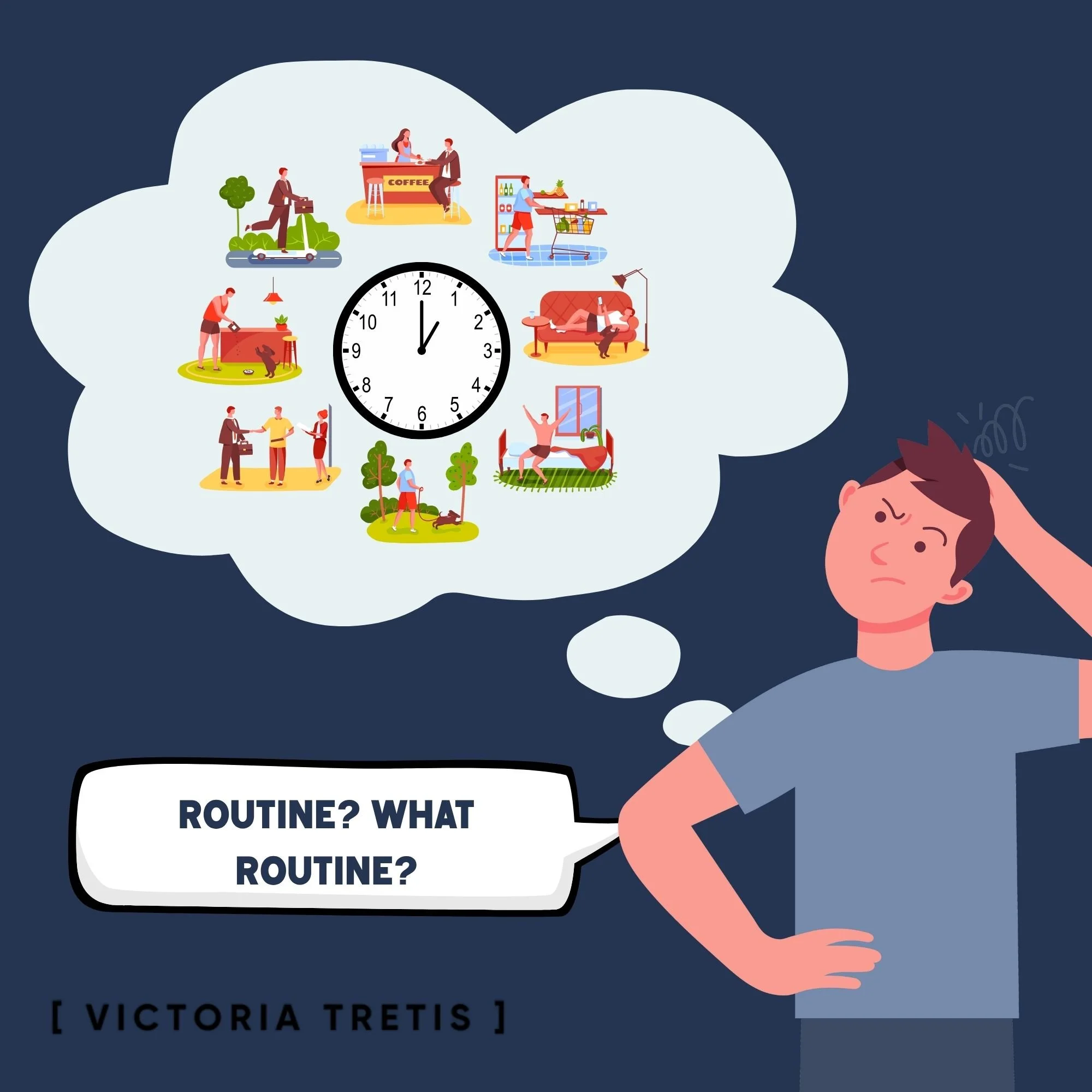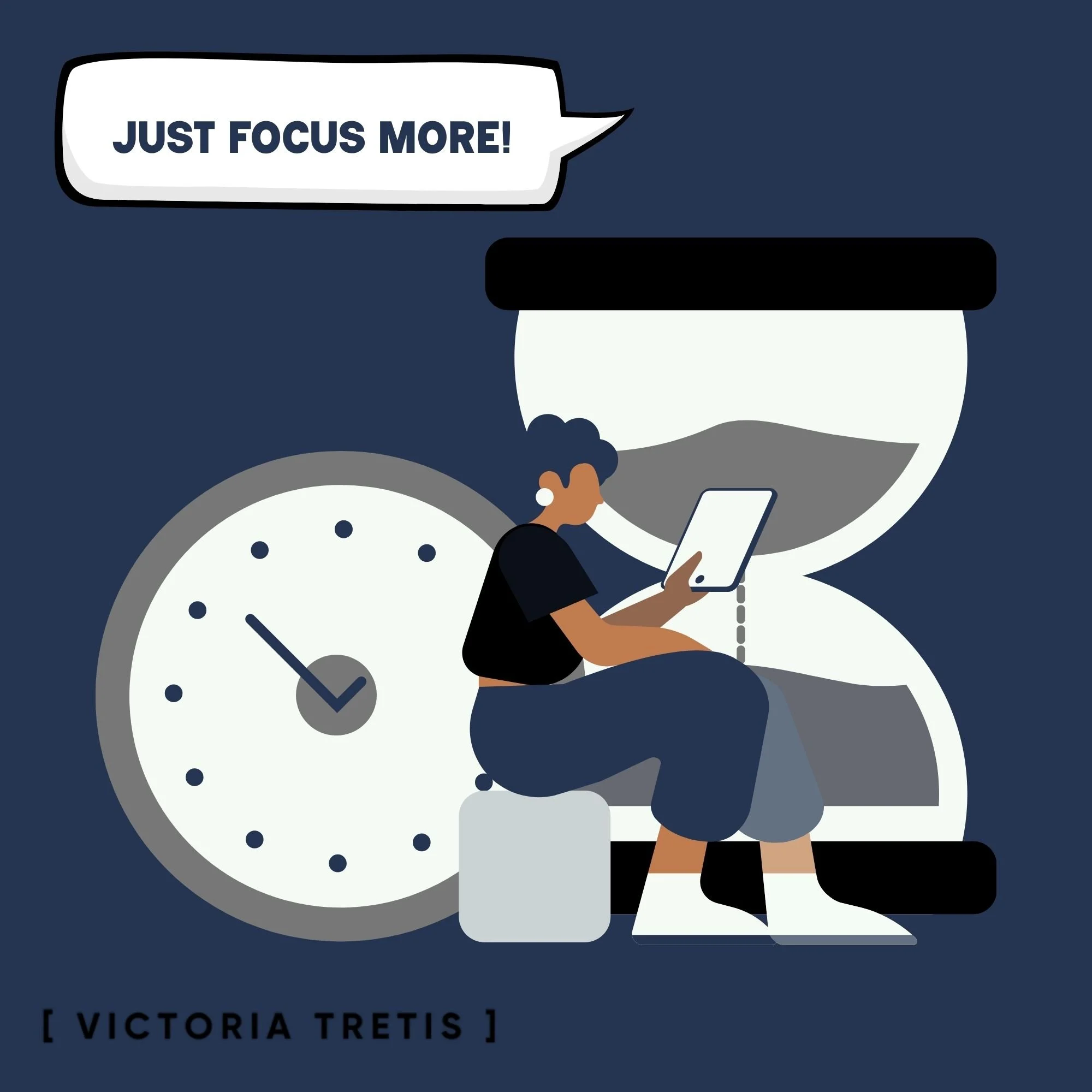
What qualities and/or qualifications should my coach have? 4 things to look for in a coach
Coaching is highly personal and heavily reliant on psychological trust. With that in mind, how do you know the coach you’re working with has the right qualifications and experience? We delve into all of that and more in this article.

The alternative guide to creating a routine when you have ADHD
Does the very idea of a routine make the walls feel like they're closing in? Like someone's trying to cram your expansive, creative mind into a box that's three sizes too small, leaving no room to think or breathe?
If you're gasping for air just nodding at that, you’re in the right place.
Think of me as your personal architect. We'll draw up a custom blueprint, one with movable walls and wide-open spaces, creating a life that's designed for you to thrive in, not just exist in.
Read on for my top “Alternative Routine” tips that will support instead of restrict you.

Ways to focus with ADHD – 9 tips to get out of a focus funk
Have you been told you need to focus more? Do you feel like you should feel more motivated and quit procrastinating?
99% of my Access to Work coaching clients say they struggle to focus. My question back to them is always the same, and it’s usually not what they expect…

RSD and ADHD – What is rejection sensitive dysphoria, and why does rejection hurt more than it should?
Rejection sensitive dysphoria (RSD) is when someone (often those with ADHD) experiences extreme emotional sensitivity and pain triggered by the perception that they have been rejected or criticised. The reaction to it is often described as unbearable fear (a response to the here and now), shame and/or anxiety (worries about the future).
So, what do you do if RSD strikes? And how do you prevent it from happening in the future? Dive into this article as we dig deep into why RSD happens and what you can do to recover and lessen those feelings in the futue.
Job Coaching Vs Therapy – And what you could get through Access to Work
Coaching and therapy can help you live a more fulfilling life, the circumstances and focus of each are very different.
Coaching concentrates on achieving goals and problem-solving in the here and now, often centring around optimising your performance at work or in business. Therapy focuses on your psychological, emotional and mental health (including things like anxiety and depression).
Being clear on the difference between the two roles will help you decide which path is right for you. Read this article to find out more.
Struggling at work with ADHD? Here’s how coaching can help
The City and Guilds Neurodiversity Index Report 2025 says that 41% of neurominority (including ADHD, ASD and Dyslexic) adults are impacted most days in the workplace.
Many of my clients come to me and say that:
work feels heavy.
they’ve fallen out of love with it.
they feel their employer has no understanding of their ADHD.
Small adjustments combined with personalised strategies can prevent many ADHDers from feeling overwhelmed and significantly improve things like time management and emotional well-being.
If you want to know more about how the coaching process works and why it can be a valuable tool for both work and life, specifically for ADHDers, read on.
Mental Health Matters: Investing in Neurodiversity Across Teams for Organisational Success
Stress and anxiety are now one of the most significant health challenges employees face in the workplace. And when you look back over the last few years, it’s not hard to see why.
Disregarding employee mental well-being has consequences that extend far beyond individual team members. It can create ripple effects on productivity, morale, and engagement throughout an organisation, ultimately undermining a company's sustainable growth.
Read on to explore effective strategies to support mental health in the workplace and give your employees every chance to thrive.
Access to Work for Neurominorities - A Guide for the Self-Employed
My self-employed clients are often surprised to discover they can access a coach like me, fully paid for through the Access to Work scheme.
Access to Work is a UK government initiative where anyone with a disability or physical or mental health condition (including ADHD, ASD, dyslexia, anxiety, depression and more) can receive support and funding to help them get back into or stay in work. That ‘work’ includes self-employment!
Read on to find out more about how Access to Work works and if you could avail of support from the scheme to help with some of the neurodivergent challenges that come with running a business.
Access to Work for Neurominorities - A Guide for Employers
Adopting a neuroinclusive approach in the workplace is essential to avoid team members becoming frustrated and disengaged, which can impact team cohesion, motivation, and staff retention levels. But with the right support, employees can gain confidence in their skills and thrive, boosting morale and profitability.
Most companies want to actively support their neurodivergent employees but just don’t know where to start. The good news is that organisations can leverage the Access to Work scheme to provide crucial support for their neurominority employees, including those with ADHD, ASD, dyslexia, anxiety, depression and more. Read on to find out how.
Access to Work for Neurominorities – A Guide for Employees
50% of neurodivergent individuals report taking time off work due to their specific challenges. And it’s really no wonder, given the pressure and exhaustion from feeling the need to constantly mask their neurodivergence at work.
But there is help available. This article is an employee’s guide to the UK Access to Work Scheme, which provides funding and support to those with disabilities and physical or mental health conditions to help them get and thrive in work. Read on to find out exactly what’s involved and whether you may be eligible.
Access to Work: Practical Support for Neurominorities in the Workplace
The UK Access to Work scheme is a government initiative that provides practical and financial support to help people with disabilities and physical or mental health conditions start or stay in work.
If work isn’t feeling particularly accessible right now, then this article is for you. It’s the first in a series about the Access to Work scheme and how it has transformed my clients’ lives. From feeling overwhelmed and falling out of love with their work to gaining clarity, purpose and control, Access to Work may provide exactly the support you need.

Embracing Neuroinclusivity: A Recap of Strategies for a Thriving Workplace
Enormous thanks for your kind words and encouragement during the series. It's always helpful to read your thoughts and feedback on what's resonating and what you'd like to read more about.
As we head into the summer holidays, I’m slowing the pace a bit to allow for more ice cream, day trips, and family time. But if you're looking for neuroinclusive expertise and gain insights into what I'm seeing that's working well, my calendar remains open - you can book a call using my Contact page.
Now, let’s get to the good stuff! The highlights from the Be Neuroinclusive series to date.... aaaand introducing: the complementary Be Neuroinclusive podcast - available on Apple Podcasts, Spotify and Google Podcasts. 🥳🥳🥳

Strategies to Deliver Constructive and Considerate Feedback
Is the feedback sandwich your preferred way of delivering feedback?
But are your colleagues resistant to your constructive criticism?
And do you dread those conversations?
Don't worry - I've got stacks of research, neuroscience, and tips in this month's article:
👉 It's time to put the feedback sandwich in the bin! 🥪
We'll dive into why some people are more sensitive to negative feedback.
Plus, there are practical tips for delivering feedback that is both constructive and considerate of different learning styles and communication preferences.
Whether you're a manager, employee, or team member, this article will provide insights and strategies for improving communication and sharing feedback in a neuroinclusive way.

Removing the Mask
Social masking and stress can be a significant challenge for many.
In this latest article in the Be Neuroinclusive series, we'll delve into the symptoms of stress and mental load, emotional disconnect, and introduce the concept of ADHD tax.
I'll share practical tips on identifying masking, reducing stress and overwhelm, and improving emotional granularity. Trust me, as someone who struggled with identifying emotions for the best part of 37 years, I know firsthand how life-changing these tools can be!
Join me on this journey of self-discovery and explore ways reduce stress and promote self-case.

A Neuroinclusive Approach to Virtual Meetings
Online meetings can be tough for neurotypes who experience sensory overload and social anxiety. That's why it's absolutely crucial for leaders to be aware of the potential negative impact they can have on all attendees and take proactive steps to create a more inclusive and accommodating environment.
And when we consider that neurodiversity means 15-20% of the world think, learn and respond differently than most, neuroinclusive meetings will, quite simply, become more effective. So, here are some quick and simple actions you can put in place with your teams to create more neuroinclusive online meetings.

Strategies to rethink procrastination backed by neuroscience
Have you ever found yourself having long breaks away from the desk instead of the 10 minutes you intended, impulsively wanting to scroll social media, or becoming hyperfocused with something you don’t tire of rather than what you should be doing? That’s the dopamine loop at work, and it can be really tricky to counteract. and actually get stuff done. Read on for anti-procrastination strategies for busy brains that actually work (and still give a dopamine hit)

Neurodiversity in leadership, and why it matters
You need to make sure you have a great mix of skills in your leadership team to benefit from diverse thinking and to see this as a huge opportunity. Having neurodiversity gives you creative thinkers, big thinkers, deep thinkers, and reflective thinkers. It provides expert analysts and people who challenge the status quo by querying current processes and methodologies, and those who spot future problems well in advance.

Creating Psychological Safety Within Neurodiverse Teams
Creating a psychologically safe workplace is crucial for all employees, but it's especially important for neurodivergent employees. To create a safe environment, employers should prioritize clear communication, provide accommodations, and actively listen to feedback. It's also important to foster a culture of respect and understanding, recognising the unique strengths and perspectives of all employees. Encouraging open dialogue and providing resources for mental health support can also promote psychological safety. By creating a welcoming and supportive workplace for neurodivergent employees, employers can help ensure that all employees can thrive and reach their full potential.

How to support neurodivergent employees in a "permacrisis".
The 2023 permacrisis has created a challenging environment for all workers, but it's especially important to support neurodivergent employees during this time. Providing clear communication, flexibility, and accommodations can help alleviate stress and anxiety. Regular check-ins and recognition of individual strengths can also boost morale. As the world continues to navigate this crisis, employers must prioritize the well-being and inclusion of all employees, including those who are neurodivergent. By doing so, organisations can foster a more supportive and resilient workforce for the future.

Neurodiversity? What is it?!
Neurodiversity is the concept that neurological differences should be recognised and valued as any other human variation. This includes labels such as autism, ADHD, and dyslexia. It's important to understand that neurodiversity is not a disorder, but rather a natural variation in the human brain. By embracing neurodiversity in the workplace, employers can tap into the unique strengths and perspectives of neurodivergent employees. This can lead to more innovative thinking, problem-solving, and creativity, ultimately contributing to a more diverse and inclusive workplace culture. By embracing neurodiversity, employers can create a more welcoming and supportive workplace for all employees, promoting inclusion and equality for everyone.
